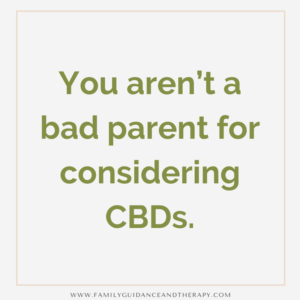1. Do: Read this blog as intended as a means to help you make the decision if CBD (cannabidiol) is right for you or your loved one...
...coming from a therapist who has watched many families add CBD and THC as part of well-rounded mental health care. This article may attend to some of the things that could be stopping you from feeling comfortable with exploring CBD. Rather than cut and paste educational or legal advice from other sites, I’ll let you Google that yourself. Make a do and don’t list for yourself. Consider why you would explore CDB and identify what is getting in the way.
2. Don’t let other people shame you or discourage you.
They may not feel CBD is right for them, their kid, their spouse, their dog and that’s okay. If you feel like it’s right for yourself or family member...have at it. You aren’t a bad parent for considering CBDs. You aren’t a morally defunct person if you have tried or use these products regularly. You don’t even need to wait until all other options have failed to try it. CBD is regularly being used as a first-line treatment for symptoms of anxiety, mood regulation, communication, sleep, gut issues and a host of other primary and secondary symptoms that autistic individuals may experience.
3. Do: Know the difference between marijuana and CBD.
CBD has a regulated percentage of THC from zero to .3% to qualify where marijuana must have a THC level above .3%. This is an important distinction in that THC is what creates the high. CBD without THC does not do this. Your kid is not going to become a stoner because you let him use CBD oils as a child. You won’t get the munchies and eat the household’s cereal and then listen to Led Zeppelin on repeat. It’s not gonna get you high. CBD may just alleviate some of your distressing symptoms, while you go about being just as productive as before.
4. Don’t just blame autism and decide not to treat symptoms.
I was recently told by a helping professional that anxiety is a global symptom of autism and thus should just be expected and may not be responsive to treatment. This is not only stigmatizing, but it’s also an awfully poor outlook on mental health symptoms. All distressing symptoms should be attended to in a non-pathologizing and humanistic/respectful way. No distressing symptom should be endured, ignored or encouraged to “learn to live with it.” Please don’t misconstrue this sentence to mean that being autistic needs to be treated...it doesn’t. Distress is distress; autistic or not. The distressing symptoms can and should be treated. If you are finding professionals in your circle not attending to you or your child’s distress, it may be that this person doesn’t have the knowledge, experience or skills to address it. It may be time to look elsewhere.
5. Do: Experiment.
We’ve heard countless childhood messages of “Don’t do drugs” and all that stuff about marijuana being a gateway drug. If you grew up in the 80s, you are part of the generation where a war was waged against drug use. These childhood messages may be stopping you from using your more mature prefrontal cortex to make the decision to try CBD for yourself or your family members. Remember, CBD is not the same thing as smoking weed.
6. Don’t be afraid to ask questions.
You ask questions when you are curious about a new therapy or psychotropic medication. It’s okay to ask ALL the questions. It’s okay to not know the difference between CBD and THC. It’s okay to have smoked pot once or hundreds of times and still have no knowledge of CBD. Also, don’t let your high school traumas of feeling uncool or unpopular because you did say “no” get in your way. You don’t need to have any past experiences in order to consider CBD.
7. Do: Test the product for yourself if planning on giving to your child.
You and your child may be very different, but you might want to explore for yourself. Trying it for yourself may help you feel more comfortable with giving it to your child. If anything, your understanding of your own personal effects will allow you to have conversations with your child or monitor change.
8. Don’t give up.
If your first product doesn’t achieve the results that you are interested in, try another brand, different dosage, another type of product (oils, edibles, lotion, capsules, etc.). It may be that the formulation that you used isn’t a fit. So often, I hear of people trying one CBD product and then saying “that doesn’t work for me/him.” This is like trying one flavor of LaCroix sparkling water and then deciding water doesn’t hydrate you. Don’t give up so quickly.
9. Do: Feel okay with being a bit confused.
Not dazed and confused, but just confused with all the information out there. There is far more scientific research than before, all kinds of big words ...even bigger than Indica and Sativa. This may keep you in a stuck process of feeling that you aren’t informed enough. Don’t worry about this. Get informed but you don’t need to be an expert. Perhaps you can be as informed as you happen to be with your favorite over-the-counter medication; because this is in fact what you are purchasing.
10. Don’t think of CBD as a catch-all, miracle cure.
Decide what symptoms you are interested in alleviating and write those down. Perhaps it’s anxiety, distraction, social withdraw, sleep, food issues. Score those symptoms in values of 1-10 with 10 being the most distressing and persistent. Take your highest values and try to treat those first 1-2 symptoms specifically. We wouldn’t list 19 things and hope that an over-the-counter medication or psychotropic medication would treat all, we can’t expect CBD to attend to every symptom either.
11. Do: Talk about it.
Since the nature of my job has confidentiality at its core, I get to hear things that some people are not willing to share with others. I’m always so surprised that CBD use is often a secret. Our autistic community values the first-hand experiences of others. Keep talking about your experiences. Other people need your story.
12. Don’t let the cost deter you.
Several products have programs for people with documented disabilities; lessening the cost and increasing your ability to access. You may also find that your doctor or your child’s pediatrician will write a prescription note. This may allow you to purchase the product with your Health Saving Account (HSA) credit card.
13. Do: Consult with an expert for those that have medical complexity or if you feel stuck.
If it appears that CBD products aren’t enough to mitigate or lessen your symptoms, consult with an expert on adding THC. Products that include TCH may be more helpful for some people. Medicinal marijuana is regularly prescribed to people with medically complex issues including children. Although recreational use of this product is legal in California; for children, it is not. If you are considering medicinal marijuana, consult an open-minded psychiatrist or pediatrician.
14. Don’t get your products from your local weed dealer.
I have nothing against this group of people and believe that marijuana should be decriminalized entirely. Yet, CBD products need to be tested to make sure that the percentages meet the industry standards. Buy products that are certified as meeting the threshold for CBD. If you want suggestions as to what brand to try, as always, ask the experts...in this case, autistic self-advocates can share more specificity than I can about what has worked and why.
Disclaimer: Don’t construe this as advice from a medical professional. Please understand the laws within your state as they differ widely. Consider this blog as a way to expand your thinking rather than specific therapeutic, medical, or legal advice on the use of CBD or THC products. Illegal drug use and abuse is a serious medical and mental health issue, please seek help if you or your loved one is struggling with addiction.

